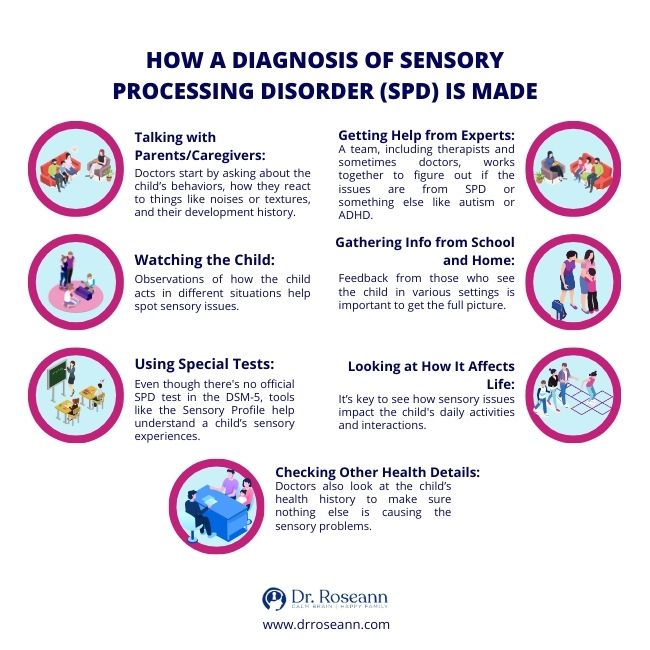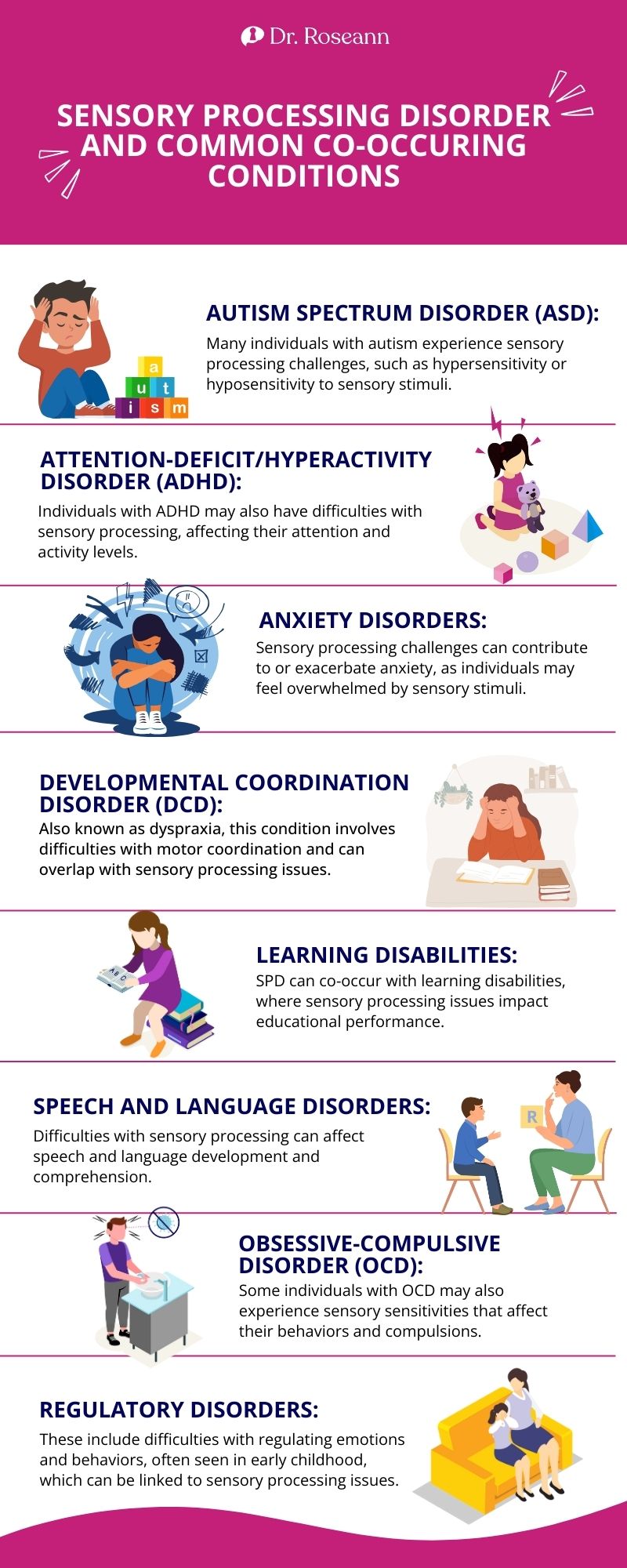Sensory Processing Disorder (SPD) is getting a lot of attention these days. People are curious if it fits into what we call neurodiversity. Neurodiversity means everyone's brain works in its own special way, including those with autism, ADHD, and now maybe SPD too. SPD is when the brain has a hard time dealing with what we see, hear, touch, taste, or smell.
I've been a psychotherapist for 32 years, helping lots of kids with SPD and other clinical conditions. Many of whom have sensory processing issues.
So, does SPD mean you're neurodivergent? I've learned a lot about this having worked with so many children and families. There is a lot parents can do who are trying to figure out how to best help their kids with different mental health needs. Let's dive into SPD and see how it fits into the bigger picture of how our brains work differently.
What is SPD?
SPD, also known as Sensory Processing Disorder, involves challenges in processing and responding to sensory information from the environment. Individuals with SPD may experience hypersensitivity (over-responsiveness) or hyposensitivity (under-responsiveness) to sensory stimuli, affecting various aspects of daily life.
Living with SPD can significantly impact your child’s daily life. It affects their social interactions, academic performance, and emotional well-being. For instance, hypersensitivity to auditory stimuli may make it challenging to concentrate in noisy environments, such as classrooms or busy streets.
On the other hand, hyposensitivity to tactile input may result in seeking intense sensory experiences. which leads to disruptive behaviors or difficulties with personal boundaries. These challenges can contribute to anxiety, stress, and frustration, further exacerbating the impact of SPD on individuals' overall functioning.
Diagnosis of SPD
Diagnosing SPD can be complex. While it's not officially recognized in the DSM-5 as a standalone diagnosis. The lack of official recognition of diagnostic criteria for sensory processing disorder poses challenges for clinicians and individuals seeking diagnosis and support.
The overlap between autism, sensory integration disorder and ADHD symptoms can complicate the diagnostic process further. However, increasing awareness and research efforts are shedding light on the distinct nature of SPD to emphasize the need for comprehensive assessment tools and tailored interventions.

SPD and Neurodiversity
The relationship between Sensory Processing Disorder and neurodiversity is intricate and multi-layered as it covers various factors that contribute to the diversity of human neurological experiences. While many children with SPD may also present with co-occurring neurodevelopmental conditions such as autism or ADHD, it's essential to recognize that SPD can manifest independently, without necessarily being accompanied by other ADHD or autism neurodivergent traits.
The overlapping symptoms and challenges observed in individuals with both SPD and co-occurring neurodevelopmental conditions pose unique diagnostic and therapeutic considerations (Masataka, 2017).
For instance, individuals with Autism Spectrum Disorder may exhibit sensory sensitivities that overlap with those seen in SPD, causing challenges in distinguishing between the two conditions.
Similarly, individuals with ADHD may experience difficulties in sensory processing, although there are different underlying mechanisms compared to those seen in SPD. Understanding these factors is crucial for accurate diagnosis and effective intervention to ensure that children receive tailored support that addresses their specific sensory needs.
Moreover, the co-occurrence of SPD with other neurodevelopmental conditions can significantly impact a child’s quality of life and functional outcomes. For example, sensory sensitivities may exacerbate challenges in social interactions and daily functioning, contributing to feelings of anxiety and overwhelm.
Additionally, individuals with SPD and co-occurring conditions may face barriers to accessing appropriate education and employment opportunities. This is why there is a need for a comprehensive support system that addresses their unique needs and abilities is necessary.
SPD and ADHD in Autism
Research suggests a high prevalence of sensory processing differences among individuals with Autism Spectrum Disorder and Attention-Deficit Hyperactivity Disorder. Sensory issues are considered core features of autism, affecting sensory processing, integration, and regulation. Similarly, individuals with ADHD may experience sensory sensitivities, although they may not always meet the criteria for SPD.
While SPD shares similarities with autism, it's not synonymous. SPD focuses specifically on sensory processing challenges, whereas autism covers a broader range of social communication deficits and repetitive behaviors. However, individuals with autism may also have SPD, showing the complex interplay between SPD in autism. Even so, it’s also possible to have SPD without autism.
Neurodivergent Sensory Issues in ASD, ADHD and SPD
Neurodivergent adults, teens, and kids frequently struggle with a myriad of sensory issues that encompass a spectrum of experiences, ranging from sensory overload to sensory-seeking behaviors and sensory avoidance. These challenges, often intertwined with conditions like ADHD, ASD and SPD profoundly influence daily functioning and interactions within diverse environments (Toronyi, 2019).
Neurodivergent sensory overload can be overwhelming, as it may lead to heightened stress levels and difficulties in processing incoming stimuli. In bustling social gatherings, children may find themselves bombarded by a cacophony of sounds and sights, triggering feelings of discomfort and agitation.
Similarly, educational settings can pose significant challenges, with fluorescent lights, crowded classrooms, and unexpected noises exacerbating sensory sensitivities. All these can hinder focus and learning.
Conversely, individuals may engage in sensory-seeking behaviors as a means of seeking comfort and stimulation. These behaviors, ranging from rocking and spinning to seeking tactile input, serve as coping mechanisms to regulate sensory input and alleviate feelings of anxiety and dysregulation. But without understanding and support, these behaviors may be misunderstood or discouraged and further exacerbate feelings of isolation and misunderstanding.
On the other hand, sensory avoidance can manifest as a reluctance or aversion to certain sensory stimuli, such as loud noises, bright lights, or certain textures. In educational or work settings, children may struggle to navigate environments that trigger sensory discomfort, leading to difficulties in participation and engagement.
For children with neurodivergent autism, these challenges can extend beyond external environments to impact activities of daily living, such as self-care routines and meal times, where sensitivities to certain textures or sensations may impede autonomy and independence.

Treatment and Support for Autism, ADHD and Sensory Issues
Addressing Sensory Processing Disorder necessitates a comprehensive and multidisciplinary approach, drawing upon a range of interventions and strategies tailored to individual needs. Occupational therapy plays a pivotal role in SPD management. This treatment method focuses on enhancing sensory processing skills, improving self-regulation, and promoting functional independence in daily activities.
In addition to occupational therapy, sensory integration therapy offers a specialized approach to addressing sensory processing difficulties. Such therapy aims to promote adaptive responses to sensory stimuli through structured, sensory-rich activities that facilitate neural connections and sensory integration.
Moreover, environmental modifications play a crucial role in creating supportive environments that accommodate sensory sensitivities and promote well-being. This may involve adjusting lighting, sound levels, and textures in home, school, and work settings to minimize sensory triggers and create spaces that foster comfort and accessibility.
Most importantly, providing accommodations and sensory-friendly strategies can significantly enhance the quality of life for individuals with SPD. From offering noise-canceling headphones and weighted blankets to implementing visual supports and structured routines, these accommodations empower individuals to manage their sensory experiences proactively and participate more fully in daily activities.
What is SPD disorder?
Sensory processing disorder (SPD) is a neurodevelopmental condition characterized by challenges in processing and responding to sensory information from the environment. Individuals with neurodivergent sensory issues may experience hypersensitivity, hyposensitivity, or difficulties in sensory integration, affecting various aspects of daily functioning.
Is sensory processing disorder neurodivergent?
Yes, sensory processing disorder is considered neurodivergent as it involves atypical processing of sensory information. Hypersensitivity sensory disorder contributes to challenges in daily functioning.
What causes sensory disorders?
The exact causes of SPD are not fully understood, but genetic factors, environmental influences, and early sensory experiences may contribute to their development. Additionally, neurological differences in sensory processing pathways may play a role in the manifestation of SPD.
Does sensory processing disorder go away?
SPD is a lifelong condition, but individuals may learn to manage their sensory sensitivities and develop coping strategies over time. Early intervention, therapy, and sensory-friendly accommodations can help individuals with SPD thrive and improve their quality of life.
What are sensory issues?
Sensory issues refer to difficulties in processing and responding to sensory information from the environment. These issues may manifest as SPD hyposensitivity, hypersensitivity, or difficulties in sensory integration, affecting various aspects of daily life.
What is sensory integration disorder?
Experts define sensory integration disorder as a sensory perception dysfunction that involves challenges in processing and responding to sensory information from the environment which affects various aspects of daily life.
Is sensory integration disorder a disability?
Sensory integration disorders are recognized as a disability by some organizations and educational institutions. However, the extent to which it impacts an individual's life can vary, and accommodations may be necessary to support people with a sensory integration disorder diagnosis in various environments.
Is SPD genetic?
While the exact causes of Sensory Processing Disorder are not fully understood, research suggests that genetic factors may play a role in its development. Additionally, environmental factors and early sensory experiences may also contribute to the manifestation of SPD.
Is HSP neurodivergent?
Yes, highly sensitive person (HSP) traits are often considered neurodivergent as they involve a heightened sensitivity to sensory stimuli and emotional experiences. However, neurodivergent HSP is not formally recognized as a neurodevelopmental condition but shares similarities with other sensory processing disorder traits.
Is HSP autism?
HSP and autism are distinct, although individuals with autism may also exhibit heightened sensitivity to sensory stimuli. HSP is characterized by increased emotional and sensory sensitivity, whereas autism encompasses a broader range of social communication deficits and repetitive behaviors.
How do you know if you're neurodivergent?
Recognizing neurodivergence involves understanding the differences in one’s neurological functioning and how they impact daily life. Common signs of being in the neurodivergent spectrum may include having several types of sensory issues, difficulties with social interactions, and atypical patterns of thinking or behavior.
Is ADD neurodivergent?
Yes, Attention Deficit Disorder (ADD) is considered neurodivergent. It is characterized by difficulties with attention, impulse control, and hyperactivity. ADD neurodivergent kids may experience challenges in various domains of functioning which requires support and accommodations.
Does having ADHD make you neurodivergent?
Yes, ADHD is classified as a neurodivergent condition due to its impact on cognitive functioning and behavior. Children with ADHD SPD may have differences in attention regulation, executive function, and emotional regulation compared to neurotypical individuals.
Is ADHD neurodivergent or neurotypical?
ADHD is considered neurodivergent, contrasting with the neurotypical population in terms of attention regulation, impulse control, and hyperactivity. Kids with ADHD and sensory processing may require accommodations and support tailored to their specific needs.
Is ADHD a sensory processing disorder?
ADHD is not typically classified as a sensory processing disorder, although individuals may experience sensory issues in ADHD. ADHD primarily involves challenges with attention regulation, impulse control, and hyperactivity.
Is SPD a form of autism?
SPD is distinct from autism, although individuals with autism may also experience sensory processing differences. SPD primarily involves challenges in processing and responding to sensory information, whereas neurodivergence autism encompasses a broader range of social communication deficits and repetitive behaviors.
Is ADD a form of autism?
ADD is not a form of autism but shares some overlapping features, such as difficulties with attention regulation and executive function. However, the diagnostic criteria and clinical presentations of ADD, ADHD, autism and sensory processing disorders significantly.
Can you have SPD without autism?
Yes, individuals can have a sensory processing disorder without autism. SPD can occur independently and may manifest as sensory sensitivities or difficulties in processing sensory information without meeting the criteria for autism spectrum disorder.
Is SPD in the DSM 5?
SPD is not officially recognized as a standalone diagnosis in the DSM-5 (Diagnostic and Statistical Manual of Mental Disorders). However, DSM neurodivergent kids may be diagnosed and treated by healthcare professionals familiar with sensory processing challenges.
Is SPD a diagnosis?
SPD is recognized as a diagnosis by some healthcare professionals, although it is not formally classified in the DSM-5. An SPD Diagnosis typically involves a comprehensive evaluation of sensory processing difficulties and their impact on daily functioning.
What is sensory modulation disorder?
Sensory modulation dysfunction involves difficulties in regulating and modulating responses to sensory stimuli. Individuals with sensory modulation disorder symptoms may experience challenges in maintaining an optimal level of arousal or responding appropriately to sensory input, leading to dysregulation and discomfort.
What is sensory aversion?
Sensory Aversion Disorder refers to a strong dislike or avoidance of certain sensory stimuli. Individuals may experience sensory aversions to specific textures, smells, tastes, sounds, or visual stimuli, leading to discomfort or distress.
What do sensory issues feel like?
Sensory processing issues can manifest differently for each individual, but they may include feelings of discomfort, agitation, overwhelm, or distress in response to sensory stimuli. These sensations may vary in intensity and duration, impacting daily functioning and quality of life.
Does ADHD have sensory issues?
While ADHD is primarily characterized by challenges in attention regulation and impulse control, individuals with sensory issues and ADHD may also experience sensory sensitivities or difficulties in sensory processing. These sensory issues and neurodivergent symptoms may contribute to difficulties in focus, concentration, and emotional regulation.
What are sensory issues in adults?
Signs of sensory processing disorder in adults include difficulties in processing and responding to sensory stimuli, similar to those experienced by children. Neurodivergence in adults with various types of sensory disorders requires understanding and support.
What is a sensory sensitivity?
Sensory sensitivity in adults and kids refers to heightened or diminished reactions to sensory stimuli. A sensory sensitivity disorder can impact an individual's perception and response to sensory input.
How is SPD diagnosed?
SPD is diagnosed through comprehensive evaluation by healthcare professionals familiar with sensory processing challenges. People who are diagnosed with SPD have professionals utilizing the criteria outlined in diagnostic manuals while considering their individual experiences and behaviors.
Does ADHD cause sensory issues?
While ADHD primarily involves challenges in attention regulation and impulse control, individuals with ADHD sensory issues may also have the over sensory processing disorder, which can contribute to symptoms such as distractibility and hyperactivity.
Do I have SPD?
There are different types of sensory processing disorders, and to determine if you have SPD, it's essential to consult with a qualified healthcare professional. They can assess your sensory process disorder symptoms, consider your medical history, and obtain observations from you and your caregivers to provide an accurate diagnosis and recommend appropriate interventions.
Citations
Masataka, N. (2017). Implications of the idea of neurodiversity for understanding the origins of developmental disorders. Physics of Life Reviews, 20, 85–108. https://doi.org/10.1016/j.plrev.2016.11.002
Toronyi, D. (2019). Hidden geographies: design for neurodivergent ways of hearing and sensing. Cities & Health, 5(1-2), 1–5. https://doi.org/10.1080/23748834.2019.1627059
Dr. Roseann is a mental health expert in Neurodivergence who frequently is in the media:
- Helping Children Thrive Podcast Benefits of Neurofeedback for children with ADHD
- Very Well Mind New Research Highlights Key Differences Among Autistic Boys and Girls
- Healthline Understanding Self-Regulation Skills
Always remember… “Calm Brain, Happy Family™”
Disclaimer: This article is not intended to give health advice and it is recommended to consult with a physician before beginning any new wellness regime. *The effectiveness of diagnosis and treatment vary by patient and condition. Dr. Roseann Capanna-Hodge, LLC does not guarantee certain results.
Are you looking for SOLUTIONS for your struggling child or teen?
Dr. Roseann and her team are all about science-backed solutions, so you are in the right place!
Grab your complimentary copy of
147 Therapist-Endorsed Self-Regulation Strategies for Children: A Practical Guide for Parents
Dr. Roseann is a Children’s Mental Health Expert and Licensed Therapist who has been featured in/on hundreds of media outlets including The Mel Robbins Show, CBS, NBC, PIX11 NYC, Today, FORBES, CNN, The New York Times, The Washington Post, Business Insider, Women’s Day, Healthline, CNET, Parade Magazine and PARENTS. FORBES called her, “A thought leader in children’s mental health.”

She coined the terms, “Re-entry panic syndrome” and “eco-anxiety” and is a frequent contributor to media on mental health.
Dr. Roseann Capanna-Hodge has three decades of experience in working with children, teens and their families with attention-deficit hyperactivity disorder (ADHD), autism, concussion, dyslexia and learning disability, anxiety, Obsessive Compulsive Disorder (OCD), depression and mood disorder, Lyme Disease, and PANS/PANDAS using science-backed natural mental health solutions such as supplements, magnesium, nutrition, QEEG Brain maps, neurofeedback, PEMF, psychotherapy and other non-medication approaches.
She is the author of three bestselling books, It’s Gonna Be OK!: Proven Ways to Improve Your Child's Mental Health, The Teletherapy Toolkit, and Brain Under Attack. Dr. Roseann is known for offering a message of hope through science-endorsed methods that promote a calm brain.
Her trademarked BrainBehaviorResetⓇ Program and It’s Gonna be OK!Ⓡ Podcast has been a cornerstone for thousands of parents facing mental health, behavioral or neurodevelopmental challenges.
She is the founder and director of The Global Institute of Children’s Mental Health, Neurotastic™Brain Formulas and Dr. Roseann Capanna-Hodge, LLC. Dr. Roseann is a Board Certified Neurofeedback (BCN) Practitioner, a Board Member of the Northeast Region Biofeedback Society (NRBS), Certified Integrative Mental Health Professional (CIMHP) and an Amen Clinic Certified Brain Health Coach. She is also a member of The International Lyme Disease and Associated Disease Society (ILADS), The American Psychological Association (APA), Anxiety and Depression Association of America (ADAA) National Association of School Psychologists (NASP), International OCD Foundation (IOCDF).
© Roseann-Capanna-Hodge, LLC 2024










